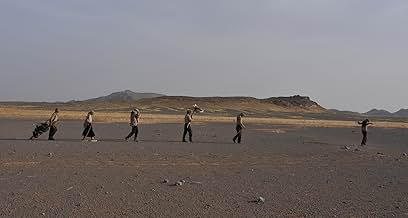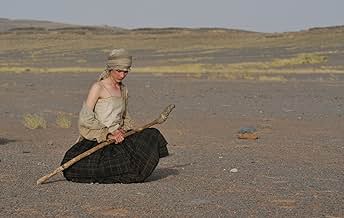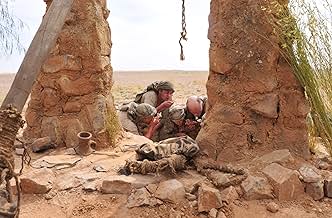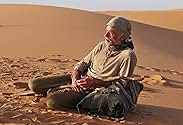साइबेरियाई गुलाग भारत में आजादी के लिए पैदल चार हजार मील की यात्रा करते हैं।साइबेरियाई गुलाग भारत में आजादी के लिए पैदल चार हजार मील की यात्रा करते हैं।साइबेरियाई गुलाग भारत में आजादी के लिए पैदल चार हजार मील की यात्रा करते हैं।
- निर्देशक
- लेखक
- स्टार
- 1 ऑस्कर के लिए नामांकित
- 4 जीत और कुल 5 नामांकन
Gustaf Skarsgård
- Voss
- (as Gustaf Skarsgard)
Zachary Baharov
- Interrogator
- (as Zahari Baharov)
Sally Brunski
- Janusz's Wife, 1939
- (as Sally Edwards)
Dejan Angelov
- Andrei
- (as Deyan Angelov)
Mariy Rosen
- Lazar
- (as Marii Grigorov)
Nikolay Stanoev
- Yuri
- (as Nikolai Stanoev)
फ़ीचर्ड समीक्षाएं
This is a film for people who appreciate epic landscapes and survivor stories. It has some engaging characters but not brilliant dialogue or complicated characters. Mostly, it is a visual film, displaying the vulnerability of a few people in a harsh, vast, beautiful landscape. They must depend on each other, and they develop an intimacy based on their shared struggle rather than on deep conversations and emotional revelations, or at least, not until a young girl joins them. Weir seems to be commenting on the yin yang of masculinity/femininity at times in this film. I also liked the subtle underlying commentary on the brutal oppression of the Soviet regime under Stalin.
All of the actors were good; Farrell adds a touch of humor, Sturgess portrays anguish well, and Harris is a good tough old guy--his usual persona. By the way, Manohla Dargis in The New York Times complains that Farrell is too good-looking to be a Russian gangster. What this assessment is based on I can't imagine; doubt Dargis hangs with Russian gangsters.
All of the actors were good; Farrell adds a touch of humor, Sturgess portrays anguish well, and Harris is a good tough old guy--his usual persona. By the way, Manohla Dargis in The New York Times complains that Farrell is too good-looking to be a Russian gangster. What this assessment is based on I can't imagine; doubt Dargis hangs with Russian gangsters.
Peter Weir's first film in seven years is another exercise in sturdy direction with strong social themes running through it - recalling many of his previous works in style and content. It follows a group of escaped prisoners from a Siberian gulag in 1940 as they brave the treacherous wilderness of Asia for freedom from the Soviet regime. It's tough viewing for the most part but there is a surprising amount of comic relief along the way, provided chiefly by Colin Farrell's salty character. The group scavenge for food, even fighting off wolves for the carcass of an animal at one point - but the constant bickering and relentless doom and gloom does begin to wear. The film picks up however once Saoirse Ronan enters the picture and her youthful feminine presence brings an interesting dynamic. Emoting with a flawless Polish accent (almost like a mini-Streep) her character is one of the more compelling and layered and gives this emerging young actress a chance to display her skills. The cinematography is serviceable but hardly spectacular - capturing a harsh, arid landscape as opposed to Malick-like celebration of nature.
As the film wears on, the struggle to survive intensifies, particular when they reach the Ghobi desert - the scenes are very well done but viewing becomes quite grueling. Harris bring a certain integrity to his role in a rather unshowy performance with not much character introspection (I can see why his Oscar buzz has disappeared). In fact character development across the board is quite lacking, and watching the plot unfold, with the knowledge of the outcome of the story already provided in the opening titles - the narrative becomes quite arbitrary and the story doesn't always sustain interest. The final leg of the journey through the Himalayas almost seems rushed compared to the bloated second act. Still, it's a very well-made film with good acting and visuals - just don't expect to be inspired.
As the film wears on, the struggle to survive intensifies, particular when they reach the Ghobi desert - the scenes are very well done but viewing becomes quite grueling. Harris bring a certain integrity to his role in a rather unshowy performance with not much character introspection (I can see why his Oscar buzz has disappeared). In fact character development across the board is quite lacking, and watching the plot unfold, with the knowledge of the outcome of the story already provided in the opening titles - the narrative becomes quite arbitrary and the story doesn't always sustain interest. The final leg of the journey through the Himalayas almost seems rushed compared to the bloated second act. Still, it's a very well-made film with good acting and visuals - just don't expect to be inspired.
I am very surprised that this movie was ever made. After all, the world has seldom really talked about Soviet gulags and it's not like this is a fun or cinematic topic. In addition, it took a lot of trouble to create the sets and film in places such as Bulgaria, Mongolia and India.
The story begins in 1940 in a prison camp in Siberia. The purpose of the camp is to essentially work the prisoners to death and hundreds of them were spread throughout the old Soviet Union. Knowing that they won't survive for long, a small group of prisoners plan an escape. The problem is that such an escape seems impossible, as it is many thousands of miles to freedom....through Siberia and the Gobi Desert in Mongolia AND the Himalayas to freedom in India.
This story is based on a book by a person who claims to have done such an escape. However, the voracity of this account is highly questionable and so the film does not purport to be any one person's tale but a fictionalization of what could have occurred.
The story is very slow and methodical but it also is never dull. I credit that with an excellent script as well as direction by Peter Weir. As for the acting, it was exceptional as well...gritty, realistic and tough. Overall, a rather amazing movie...well worth seeing and important because it brings to light the evil of the Soviet gulag system.
The story begins in 1940 in a prison camp in Siberia. The purpose of the camp is to essentially work the prisoners to death and hundreds of them were spread throughout the old Soviet Union. Knowing that they won't survive for long, a small group of prisoners plan an escape. The problem is that such an escape seems impossible, as it is many thousands of miles to freedom....through Siberia and the Gobi Desert in Mongolia AND the Himalayas to freedom in India.
This story is based on a book by a person who claims to have done such an escape. However, the voracity of this account is highly questionable and so the film does not purport to be any one person's tale but a fictionalization of what could have occurred.
The story is very slow and methodical but it also is never dull. I credit that with an excellent script as well as direction by Peter Weir. As for the acting, it was exceptional as well...gritty, realistic and tough. Overall, a rather amazing movie...well worth seeing and important because it brings to light the evil of the Soviet gulag system.
So the book has been proved false. Does this mean that the "true story" isn't true after all? There have been many claims by others that it is fact instead of fiction. Whatever - it doesn't matter, Peter Weir's "The Way Back", this movie about that book, which tells the tale of gulag escapees and their harrowing journey to freedom, is a well-told and inspiring tale than anything else.
All of the actors are terrific in their roles - Jim Sturgess as the de- facto leader of the bunch, showing a more improved and mature side to his acting since "21"; Ed Harris as the gruff American Smith, who is hard-edged and iron-willed until he eventually befriends...; Saiorse Ronan as Irene, the runaway girl who joins them on their quest - Ronan here shows a perfect balance of various emotions while not overdoing it like many child stars her age... she definitely is one of the best young actresses today; Colin Farrell as the violent yet humorous soldier who protects the team from danger in Siberia and provides comic relief when needed - Farrell shows that he can be tough yet likable at the same time without being completely overblown and shows his versatility as an actor; European actors Dragos Bucur, Alexandru Potocean, Sebastian Urzendowsky and Gustaf Skarsgård round off the remaining escapees and they all acted great in their respective and differing roles. The chemistry between all of the actors at parts are great.
Having said that, the film's only flaw is that it sacrificed substantial characterization for realism and visual spectacles. The characters are thinly but not overly so fleshed out, and the interactions between them are short before the next walking shot. But when it comes to realism and believability the film succeeds. I was surprised when I saw National Geographic was one of the co-producers of the film, but I wasn't as soon as I saw how realistic the depictions of survival the characters did in the film. Men will do anything to escape to freedom, and the determination and spirit to survive in a harsh and unforgiving natural world, is what Weir and his script is trying to say, but the walking parts are written in masterful detail that any line of dialog may ruin it, so silence is sometimes golden in these parts. The screenplay also challenges the usual Hollywood clichés that usually are found in this film genre, and it transforms them into better, more realistic and sometimes unsettling situations.
Production-wise, the film is a triumph. The production design is great and makes extremely well use of real locations. The cinematography by Russell Boyd is dazzling, simply marvelous, it is wide, sweeping and epic, with lush scenery of forests, deserts and the snow-peaked Himalayas exquisitely shot throughout. The wide cinematography makes the experience even more harrowing thanks to Lee Smith's fluid and crisp editing and Burkhard Dallwitz's great music score and terrific music timing - Dallwitz and Weir know when and how music/sound can be used in a scene, and that sometimes, silence is crucial to certain moments. Here, Weir uses that silence to terrific and very intense effect, and with his extremely focused direction, manages to being out a very exhilarating and at the same time excruciating (in a good way) experience. So much so that I forgot about the controversy surrounding the "true story" and found myself hugely engrossed in the movie, not wanting it to end.
In short, the film lightly suffers from lack of proper characterization, but is heavy on almost everything else - acting, directing, cinematography, production value and music. If it had proper characterization, it would have been an instant classic and a contender for the Best Picture Oscar. Still, as it stands, "The Way Back" is still an epic adventure; an inspiring, sometimes funny, and often intense and harrowing experience that also proves that Peter Weir is still an ambitious tour-de-force filmmaker.
Overall rating: 77/100
All of the actors are terrific in their roles - Jim Sturgess as the de- facto leader of the bunch, showing a more improved and mature side to his acting since "21"; Ed Harris as the gruff American Smith, who is hard-edged and iron-willed until he eventually befriends...; Saiorse Ronan as Irene, the runaway girl who joins them on their quest - Ronan here shows a perfect balance of various emotions while not overdoing it like many child stars her age... she definitely is one of the best young actresses today; Colin Farrell as the violent yet humorous soldier who protects the team from danger in Siberia and provides comic relief when needed - Farrell shows that he can be tough yet likable at the same time without being completely overblown and shows his versatility as an actor; European actors Dragos Bucur, Alexandru Potocean, Sebastian Urzendowsky and Gustaf Skarsgård round off the remaining escapees and they all acted great in their respective and differing roles. The chemistry between all of the actors at parts are great.
Having said that, the film's only flaw is that it sacrificed substantial characterization for realism and visual spectacles. The characters are thinly but not overly so fleshed out, and the interactions between them are short before the next walking shot. But when it comes to realism and believability the film succeeds. I was surprised when I saw National Geographic was one of the co-producers of the film, but I wasn't as soon as I saw how realistic the depictions of survival the characters did in the film. Men will do anything to escape to freedom, and the determination and spirit to survive in a harsh and unforgiving natural world, is what Weir and his script is trying to say, but the walking parts are written in masterful detail that any line of dialog may ruin it, so silence is sometimes golden in these parts. The screenplay also challenges the usual Hollywood clichés that usually are found in this film genre, and it transforms them into better, more realistic and sometimes unsettling situations.
Production-wise, the film is a triumph. The production design is great and makes extremely well use of real locations. The cinematography by Russell Boyd is dazzling, simply marvelous, it is wide, sweeping and epic, with lush scenery of forests, deserts and the snow-peaked Himalayas exquisitely shot throughout. The wide cinematography makes the experience even more harrowing thanks to Lee Smith's fluid and crisp editing and Burkhard Dallwitz's great music score and terrific music timing - Dallwitz and Weir know when and how music/sound can be used in a scene, and that sometimes, silence is crucial to certain moments. Here, Weir uses that silence to terrific and very intense effect, and with his extremely focused direction, manages to being out a very exhilarating and at the same time excruciating (in a good way) experience. So much so that I forgot about the controversy surrounding the "true story" and found myself hugely engrossed in the movie, not wanting it to end.
In short, the film lightly suffers from lack of proper characterization, but is heavy on almost everything else - acting, directing, cinematography, production value and music. If it had proper characterization, it would have been an instant classic and a contender for the Best Picture Oscar. Still, as it stands, "The Way Back" is still an epic adventure; an inspiring, sometimes funny, and often intense and harrowing experience that also proves that Peter Weir is still an ambitious tour-de-force filmmaker.
Overall rating: 77/100
Six-time Academy Award nominated director Peter Weir ("Master and Commander: The Far Side of the World", "The Truman Show") directed and wrote the adaptive screenplay for "The Way Back" based on the book "The Long Walk: A True Story of a Trek to Freedom" by Slawomir Rawicz, a Polish POW from the Soviet Gulag where the story begins, and on real life accounts of the journey. The film unluckily missed a very well deserved 2010 Oscar birth telling the tale about an unthinkable journey of kinship created between a diverse group of Soviet Gulag escapees. Their journey covers 4,000 miles from Siberia to freedom in India giving meaning to the word incredible. The cinematography is used most majestically by capturing panoramas of the strikingly dangerous yet breathtakingly beautiful landscapes. The splendor of the film goes beyond the wilderness with the selection of a very accurate and diverse cast starring Jim Sturgess ("21"), Ed Harris ("The Rock"), Colin Farrel ("In Bruges"), Saoirse Ronan ("The Lovely Bones"), and Mark Strong ("Sherlock Holmes"). Together they recreate the peril and wonder of the impossible journey on foot that started with the idea of a man named Khabrov (Strong) to break out of the Godforsaken Soviet Gulag in Siberia. A Polish man named Janusz, driven by the fire to get back to his wife, puts the idea into action. An older, wise American known as Mr. Smith (Harris) joins ranks when he hears about Janusz's plans and warns him that Khabarov never had any aspiration to actually leave the place. However, the idea becomes a reality attracting an indebt prisoner named Valka (Farrel) and four other men escaping the Gulag and meeting a young girl named Irena (Ronan) on the path to freedom.
The story is synonymous with walking more than a marathon every day through harsh terrain, uncontrollable elements and lack of food and water for an open-ended amount of time. The gravity of the story is unmatched by any film released this year; told through the art of cinematography and the acting talents of the cast. Both Oscar worthy aspects of the film, however, the cinematography itself is unmatched by any 2010 film. Also, a lot can be said about the all-star cast concerning Jim Sturges, Ed Harris, Colin Farrel, Mark Strong, and Saoirse Ronan and their superb character portrayals; however, there is one other actor that stands out. A man in the group named Zoran played by Dragos Bucar is able to break through the thin layer of dramatic tension in the film with his clever social humor. The comedy he creates does not take away from the story and instead adds to the story allowing the characters to unwind and have a good time.
The outcomes to films within the "jailbreak" genre are inevitably easy to predict, therefore, causing films like "The Way Back" to work hard in order to be original. "The Way Back" does a very good job by differentiating the way it is captured on film through its beautiful cinematography; however, great films such as "The Shawshank Redemption" and "The Great Escape" will always be on top of the genre. "The Way Back" isn't far off though with its main shortcoming stemming from the ending relying on a storyline tangent not fully developed (not the montage, the montage is great).
This is the most underrated movie of 2010 with its limited advertising exposure, release and lack of award fulfillment with only one Oscar nomination for Best Make Up (well deserved as the group of survivors' skin is torn apart by the elements). A 4,000-mile true story taking place in the World War II era with excellent cinematography and great acting seems like the ideal candidate for the Oscars. So why was this must see film left in the shadows?
The story is synonymous with walking more than a marathon every day through harsh terrain, uncontrollable elements and lack of food and water for an open-ended amount of time. The gravity of the story is unmatched by any film released this year; told through the art of cinematography and the acting talents of the cast. Both Oscar worthy aspects of the film, however, the cinematography itself is unmatched by any 2010 film. Also, a lot can be said about the all-star cast concerning Jim Sturges, Ed Harris, Colin Farrel, Mark Strong, and Saoirse Ronan and their superb character portrayals; however, there is one other actor that stands out. A man in the group named Zoran played by Dragos Bucar is able to break through the thin layer of dramatic tension in the film with his clever social humor. The comedy he creates does not take away from the story and instead adds to the story allowing the characters to unwind and have a good time.
The outcomes to films within the "jailbreak" genre are inevitably easy to predict, therefore, causing films like "The Way Back" to work hard in order to be original. "The Way Back" does a very good job by differentiating the way it is captured on film through its beautiful cinematography; however, great films such as "The Shawshank Redemption" and "The Great Escape" will always be on top of the genre. "The Way Back" isn't far off though with its main shortcoming stemming from the ending relying on a storyline tangent not fully developed (not the montage, the montage is great).
This is the most underrated movie of 2010 with its limited advertising exposure, release and lack of award fulfillment with only one Oscar nomination for Best Make Up (well deserved as the group of survivors' skin is torn apart by the elements). A 4,000-mile true story taking place in the World War II era with excellent cinematography and great acting seems like the ideal candidate for the Oscars. So why was this must see film left in the shadows?
क्या आपको पता है
- ट्रिवियाThis movie was inspired by the memoir of Slavomir Rawicz depicting his escape from a Siberian gulag and subsequent four thousand-mile walk to freedom in India. Incredibly popular, it sold over five hundred thousand copies, and is credited with inspiring many explorers. However, in 2006, the BBC unearthed records (including some written by Rawicz) that showed he had been released by the U.S.S.R. in 1942. In 2009, another former Polish soldier, Witold Glinski, claimed that the book was really an account of his own escape. However, this claim too has been seriously challenged.
- गूफ़Janusz demonstrates a method using shadows of a stick and rock to find the compass direction of south. Yet, many of the scenes show them walking in a direction inconsistent with sun angles i.e. sun at their backs, which would have them walking north.
- कनेक्शनFeatured in Breakfast: 7 दिसम्बर 2010 को प्रसारित एपिसोड (2010)
टॉप पसंद
रेटिंग देने के लिए साइन-इन करें और वैयक्तिकृत सुझावों के लिए वॉचलिस्ट करें
विवरण
- रिलीज़ की तारीख़
- कंट्री ऑफ़ ओरिजिन
- भाषाएं
- इस रूप में भी जाना जाता है
- Camino a la libertad
- फ़िल्माने की जगहें
- उत्पादन कंपनियां
- IMDbPro पर और कंपनी क्रेडिट देखें
बॉक्स ऑफ़िस
- बजट
- $3,00,00,000(अनुमानित)
- US और कनाडा में सकल
- $27,01,859
- US और कनाडा में पहले सप्ताह में कुल कमाई
- $12,18,868
- 23 जन॰ 2011
- दुनिया भर में सकल
- $2,41,72,201
- चलने की अवधि
- 2 घं 13 मि(133 min)
- रंग
- ध्वनि मिश्रण
- पक्ष अनुपात
- 2.35 : 1
इस पेज में योगदान दें
किसी बदलाव का सुझाव दें या अनुपलब्ध कॉन्टेंट जोड़ें




































